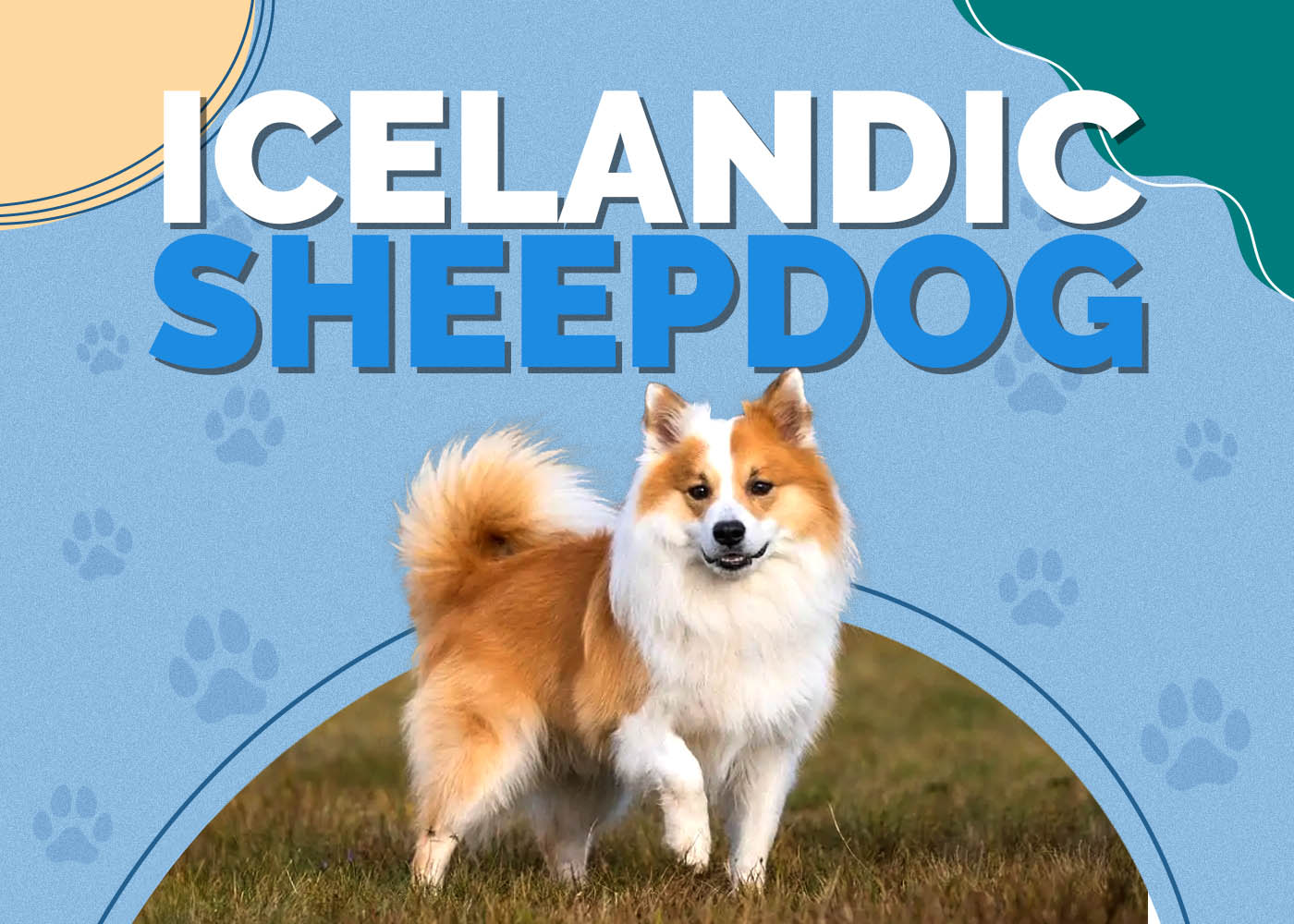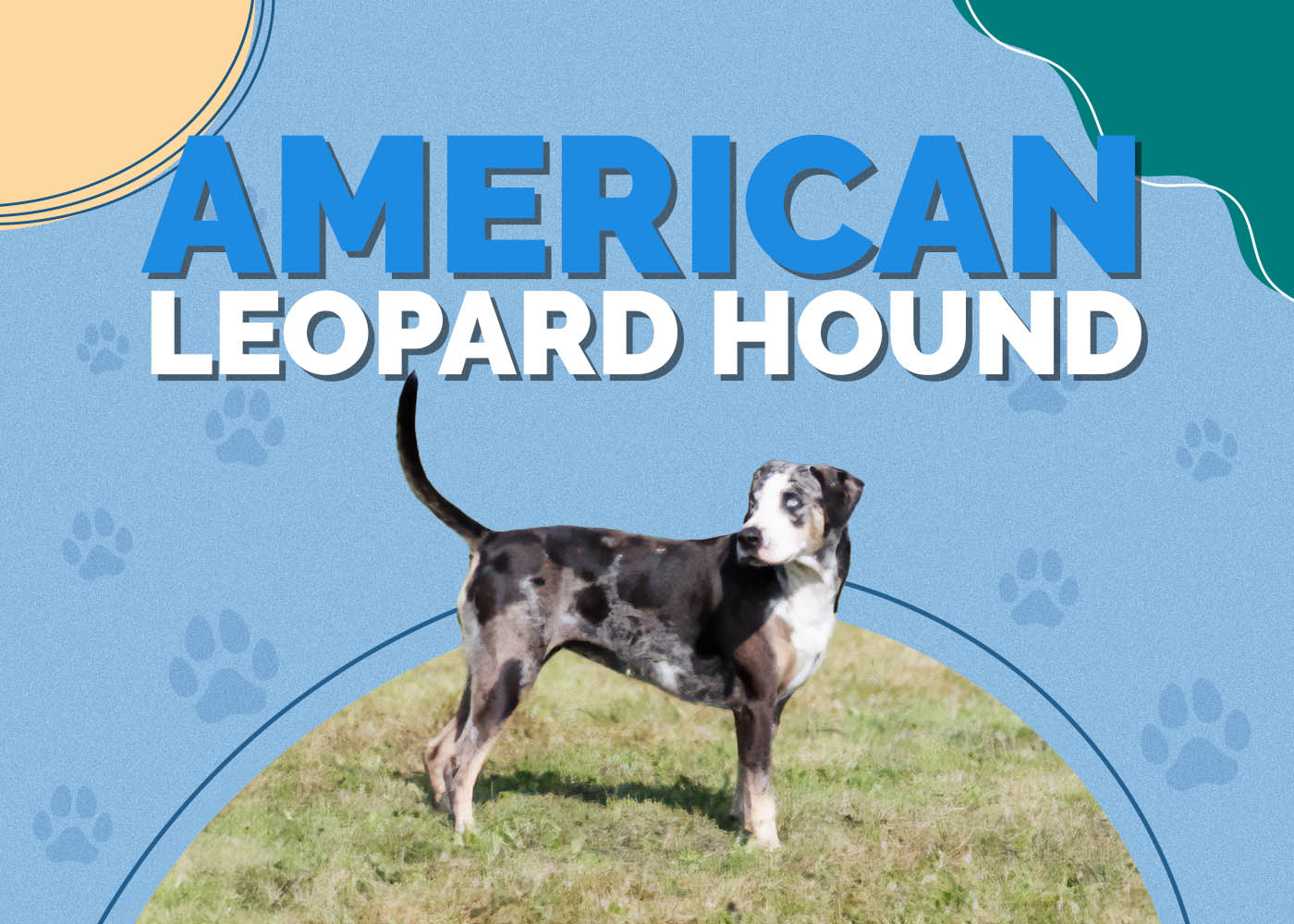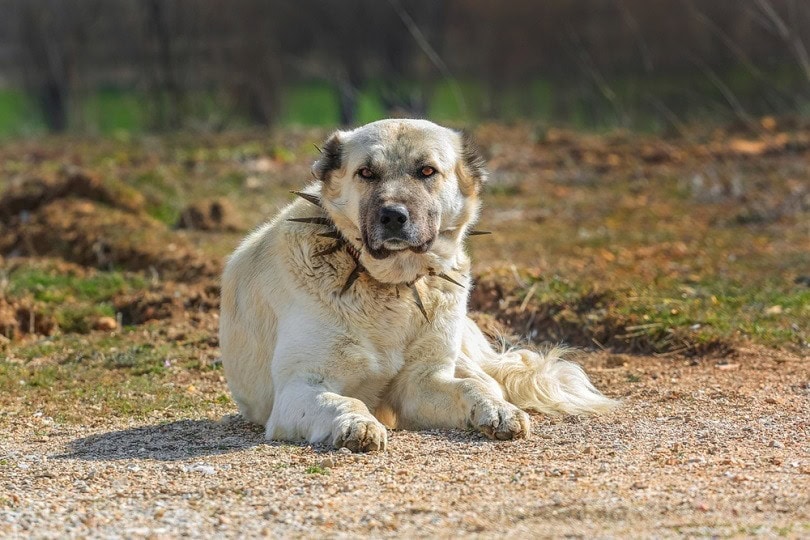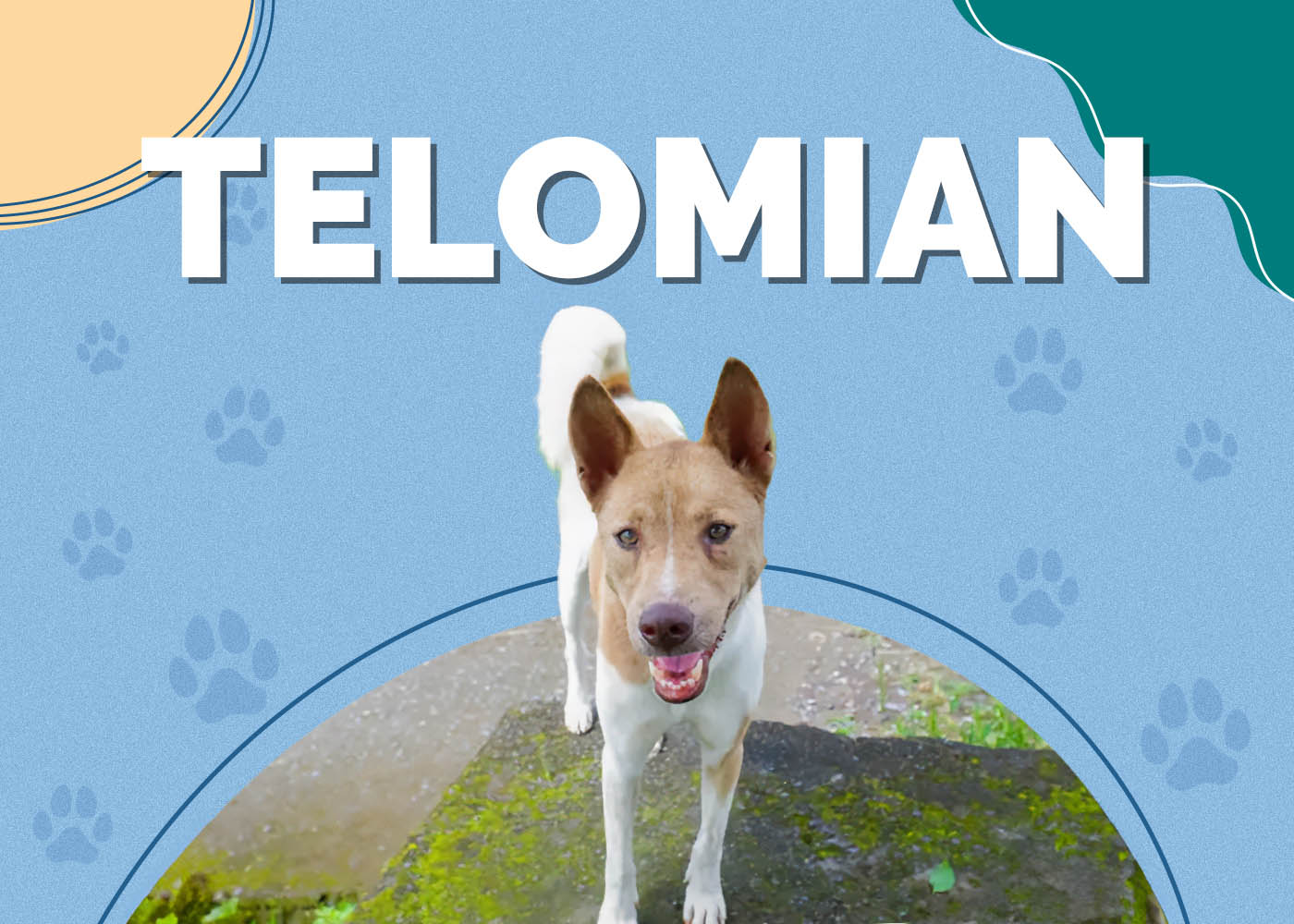Icelandic Sheepdog: Breed Info, Pictures, Care Guide & Facts

Updated on

Height:
17–19 inches
Weight:
20–30 pounds
Lifespan:
12–15 years
Colors:
Black, brown, cream, grey, fawn, pied, brindle
Suitable for:
Attentive owners, families of any size, homeowners with large yards, active owners
Temperament:
Friendly, loving, playful, attentive, outgoing, hardworking
The Icelandic Sheepdog is a purebred dog that is, unsurprisingly, believed to have originated in Iceland. They are very friendly and outgoing dogs who are welcoming toward friendly faces and strangers alike. These dogs are playful and energetic, and they thrive on human interaction. They get along with just about everyone they meet, so they don’t typically make the best guard dogs.
The Icelandic Sheepdog was originally bred to protect flocks of sheep and other livestock in Iceland, so they will be happiest when patrolling your yard or protecting your home.
These dogs can make excellent family pets for the right families, and we’ll go over everything you need to know about the breed to find out if they are a good match for your home!
Icelandic Sheepdog Puppies
The first thing you need to be prepared for before committing to an Icelandic Sheepdog is their desire to be around humans. These dogs don’t like being left alone, so if you and your family members will be out of the house for extended periods of time, you should reconsider getting an Icelandic Sheepdog. They will very quickly turn to destructive behavior if they feel they are being neglected or left alone for too long.
You’ll also need to be prepared for shedding, and a whole lot of it! These dogs have a fairly long coat that is very dense, and they shed constantly throughout the year. They shed the most in the spring and fall, but you need to be prepared for year-round shedding. Invest in a high-end vacuum and be prepared to use it once or twice a week to keep up with this dog’s loose fur.
Lastly, you should be prepared for barking from your Icelandic Sheepdog. These dogs do have a rather high tendency to bark, so if you live in an apartment or have noise constraints, this may not be the ideal breed for you. Early training can help limit barking, but you likely won’t stop it altogether.

3 Little-Known Facts About the Icelandic Sheepdog
1. They Are Iceland’s Only Native Breed
The Icelandic Sheepdog certainly isn’t the only breed found in Iceland, but it’s the only breed that is believed to have originated there.
2. They Were Bred to Ward Off Birds
Herding dogs and those bred to guard against land predators are common, but the Icelandic Sheepdog is rather unique in that it was bred specifically to protect livestock from birds of prey. These dogs were originally intended to help herd sheep on farms in Iceland and to keep a constant eye on the sky for potential flying predators.
You’ll often find that even modern-day Icelandic Sheepdogs have a certain prey drive for birds, so they’ll often watch the sky and bark at any birds they see.
3. They Have Been Around for Centuries
The Icelandic Sheepdog was found to be directly related to a Norwegian breed, the Karelian Bear Dog. This suggests that the Icelandic Sheepdog’s ancestors were brought to Iceland from Norway by the Vikings in the 9th and 10th centuries!
Temperament & Intelligence of the Icelandic Sheepdog 🧠
Icelandic Sheepdogs have fairly moderate temperaments and are often calm when indoors. They do have quite a bit of energy outdoors, and they are nearly always in the mood to play, as long as they aren’t working to protect your home and yard.
Despite their willingness to ward off birds in the area, these dogs are abundantly friendly toward most other creatures and always toward humans. They often welcome attention from anyone, including strangers.
They are happy and positive dogs that also exhibit love and affection, but they do enjoy focusing on a job if one is presented to them.
Are Icelandic Sheepdogs Good for Families? 🏡
The Icelandic Sheepdog can make a wonderful family pet. They crave human interaction and attention from their owners on a nearly constant basis, so they do best in homes where there is always someone around to interact with them. They have a lot of love for their families, and this includes children. They often get along well with kids and tend to be more patient with younger children, so you won’t need to worry about your kids interacting with your pooch.
These dogs love to have a regimented schedule for their days, so if you have a family that has a regular and repetitive routine, they will happily adjust to that and fit in, as long as they aren’t left alone for too long.
Does This Breed Get Along with Other Pets? 🐶 😽
Icelandic Sheepdogs are very outgoing toward humans, and that friendliness will usually extend to other dogs. There is a chance they will show a bit of aggression toward other dogs, but early and frequent socialization will usually make for a healthy relationship between your Icelandic Sheepdog and other dogs.
Cats and other small animals are another story, however. These dogs have a fairly high prey drive, so they are very likely to have a strong urge to chase and pin down a cat or other small pet. For this reason, these dogs are not recommended for cat owners or those who have small rodents for pets.
It’s also highly recommended that you don’t bring these dogs into a home with pet birds. Icelandic Sheepdogs were specifically bred to ward off birds of prey to protect livestock, so they have a particular problem with them. You should never leave your dog alone with a bird in the house, and you should even reconsider this breed entirely if you have pet birds at all, as there is very likely to be a problem!
Things to Know When Owning an Icelandic Sheepdog:
Food & Diet Requirements 🦴
Icelandic Sheepdogs are medium-sized dogs that are fairly energetic, so you can expect to feed them around 2.5 to 3 cups of dry dog food a day. They do have some common joint issues that can be exacerbated by obesity and weight gain, so it’s important not to overfeed them. If you do notice your Icelandic Sheepdog gaining weight, cut down on the food volume or bring your pooch to the vet to get a personalized estimate on the amount of food to give your dog.
Beyond volume, you should also focus on providing a high-quality, high-protein commercial dog food that doesn’t contain a lot of fillers like grains or corn. Protein and fat will help keep your dog’s weight and energy levels stable.

Exercise 🐕
Icelandic Sheepdogs have a moderate energy level, so you’ll need to plan on exercising them for about an hour every single day. This amount of exercise will keep them healthy and will help keep their weight in check.
These dogs love to play and patrol your yard, and some owners believe this level of activity can safely replace dedicated exercise. This is not the case, and you need to walk or run your dog for about an hour a day regardless of how much playtime or yard exploration they get in a day.
Because Icelandic Sheepdogs have a high prey drive, it’s important to keep them on a sturdy and reliable leash and harness when exercising outdoors. They may lunge at squirrels, rabbits, and especially birds they see, so you need to make sure they can’t easily escape their harness to engage in a hunt.
These dogs also have a tendency to wander off, so only let your dog out in a yard that is fully secured. If given the opportunity to head out in search of prey or adventure, the Icelandic Sheepdog will very likely take it!
- A must-have contraption for active breeds! Automatic Dog Ball Launcher
Training 🦮
Icelandic Sheepdogs are rather intelligent and are usually eager to please their owners, so you shouldn’t have much difficulty with training. They pick up on commands and tricks fairly quickly, and as long as they aren’t distracted by birds or other small animals, they’re usually obedient.
You likely will need to do some training above and beyond normal obedience to reduce barking, so be prepared to begin at a young age and be consistent. They can be trained only to bark with certain stimuli like a knock at the door, but if left untrained they will bark at birds, squirrels, and any unfamiliar noises.
These dogs form strong bonds with their humans and can be rather sensitive, so throughout training, you should focus on remaining positive and loving. They do best in training situations where they are rewarded for good behavior rather than being scolded for bad behavior, so focus on what your pooch is doing correctly, and use positive reinforcement to drill in good behavior.

Grooming ✂️
As we mentioned before, year-round shedding and heavy seasonal shedding are unavoidable with Icelandic Sheepdogs. These dogs have long, dense coats, so to help cut down on shedding a bit, you should plan to brush your pooch with a pin brush and a de-shedder one to two times each week, and daily during heavy shedding seasons. You won’t eliminate shedding altogether, so also plan on routine cleaning and vacuuming!
Bathing can be done as needed if your pooch gets particularly dirty, or you can schedule regular bath time once every two months or so. More frequent bathing can deplete your dog’s natural skin oils and lead to dry skin and irritation, so avoid bathing too frequently.
You will need to clip your dog’s nails regularly to avoid cracking as well. If you can hear clicking when your dog walks on concrete or hard floors, it’s time to get the clipper out!
You should also plan to brush your dog’s teeth about once a week to help keep up with dental hygiene, and you should wipe your dog’s inner ears clean of wax buildup and debris, as these can lead to ear infections and related discomfort.
Health and Conditions ❤️
The Icelandic Sheepdog is a fairly hearty and healthy dog with few life-threatening health conditions. They aren’t without their common ailments, though, so make sure you watch for signs and symptoms of any of the below more common issues. As with any breed, yearly vet checkups are recommended to make sure your dog is as healthy as possible.
- Cataracts
- Cryptorchidism
- Hip dysplasia
- Patellar luxation
- Distichiasis
Male vs Female
Male Icelandic Sheepdogs tend to be a bit larger than females; they normally weigh about the same, but they can stand a few inches taller. As far as behavior and personality go, the breed as a whole will normally have a fairly balanced and even temperament regardless of sex. You may find that males have a higher prey drive, but other than this, both genders will be about the same.
Final Thoughts
The Icelandic Sheepdog is an abundantly friendly and intelligent dog who is outgoing and social. They love human interaction, and they often don’t mind if they’re getting attention from family members or complete strangers.
They usually have a fairly high energy level, so even outside of dedicated exercise, Icelandic Sheepdogs will love exploring, carrying out a specific job, or playing. They will get along well with all of your family members including children, so they’ll often be great additions to your home.
These dogs are fairly easy to train as well, so as long as you have the time and patience to dedicate to regular training, grooming, and exercise, this breed may be a great match for you!
Featured Image Credit: Bildagentur Zoonar GmbH, Shutterstock














